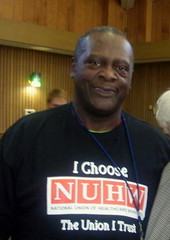(From our friends at the Union of Concerned Scientists – promoted by Brian Leubitz)
First of its kind economic analysis shows significant cuts in global warming pollution will cost small businesses only pennies
Los Angeles County – As international climate treaty negotiations begin in Copenhagen amid controversy over economic impacts, a new report shows that the costs for small business operating under California’s landmark climate law (AB 32) can be measured in pennies. Conducted by leading economists and released by the Union of Concerned Scientists (UCS) today, the report finds that AB 32 policies will only increase the percent of small business revenue spent on energy by only 0.3 percentage points–from 1.4 to 1.7 percent–in 2020. In a case study which examines a real world small business–Border Grill restaurant–the report finds AB 32 will cost diners a mere 3 cents extra per $20 meal in 2020.
The analysis, The Economic Impact of AB 32 on California Small Businesses ( www.ucsusa.org/small_business ), a peer-reviewed first-of-its-kind analysis, uses empirical data on the cost characteristics of small businesses to estimate the economic impacts of AB 32 and was commissioned by UCS and conducted by The Brattle Group, an international economic consulting firm.
“Our report finds that the incremental cost impact of AB 32 on the average California small business will be relatively small and definitely manageable,” said Jurgen Weiss of the Brattle Group, and co-author of the report. “The AB 32 cost impact pales in comparison to the effect of inflation over ten years, and falls well within the range of historic cost variation most small businesses face everyday regardless of climate policy.”
The Brattle Group projected the likely changes in electricity, natural gas, and gasoline prices due to the major AB 32 policies: cap and trade (which puts a price on carbon), a 33% renewable energy standard, increased energy efficiency measures, and a low-carbon fuel standard.
(more…)
Report Highlights
~~ Most small businesses will not be directly regulated under AB 32, therefore AB 32 policies will only impact them indirectly to the extent that these policies cause energy prices (electricity, natural gas, transportation) to change.
~~ The average small business spends less than 1.5 percent of revenues on energy-related costs. So any increase in the price of energy will have a modest financial impact.
~~ Increases projected in electricity, gas and transportation fuel costs due to AB 32 are lower than recent increases in the same rates caused by factors wholly unrelated to environmental regulations.
~~ Increased costs of intermediate products used by small business (food, supplies and services) that result from higher energy prices will also have only a modest impact on small business.
“Energy efficiency is one of the key ways businesses can save money on energy costs” said Jasmin Ansar, a climate economist with UCS. “This report does not fully reflect the potential cost savings to small businesses from energy efficiency, so even the modest increases forecast by the study overstate the likely cost of AB 32 to small businesses.”
The report includes a case study of Border Grill, a Los Angeles-based Mexican restaurant, chosen because restaurants are more energy intensive than the average small business and represent the largest share of employment in any small business category – 10 percent of total statewide employment. After auditing five years of the restaurant’s electricity and gas bills, The Brattle Group developed a 10-year business projection based on historical data, and used this projection, along with macro-economic assessment of change in energy prices, to develop the case study results.
The analysis found that by 2020, the cost of a typical dinner at the Border Grill would rise less than 0.1 percent-or less than three cents for every $20.
“Such a miniscule increase, even if noticed, would not cause our customers any heartburn,” commented Border Grill owners and head chefs Mary Sue Milliken and Susan Feniger. “We’re known as the ‘Too Hot Tamales,’ and we’re worried about a Too Hot Future. Our customers are just as worried as we are, and would be more than willing to pay an extra 3 cents to help avoid the most catastrophic impacts of global warming.”
According to the report, in 2020, Border Grill will be spending 2% of its revenue on energy. By investing in a robust set of efficient appliances, vehicles, and other equipment, the restaurant will be able to use even less energy and improve its productivity and competitiveness.
~~~~~~~~~~~~~~~~~~~~~~~~~~~~~~~~~~~~~~~
This report debunks the myth that some large businesses are spewing, claiming that AB 32–the state’s Global Warming Solutions Act–will hurt small businesses.
For more info, go to www.ucsusa.org/small_business

